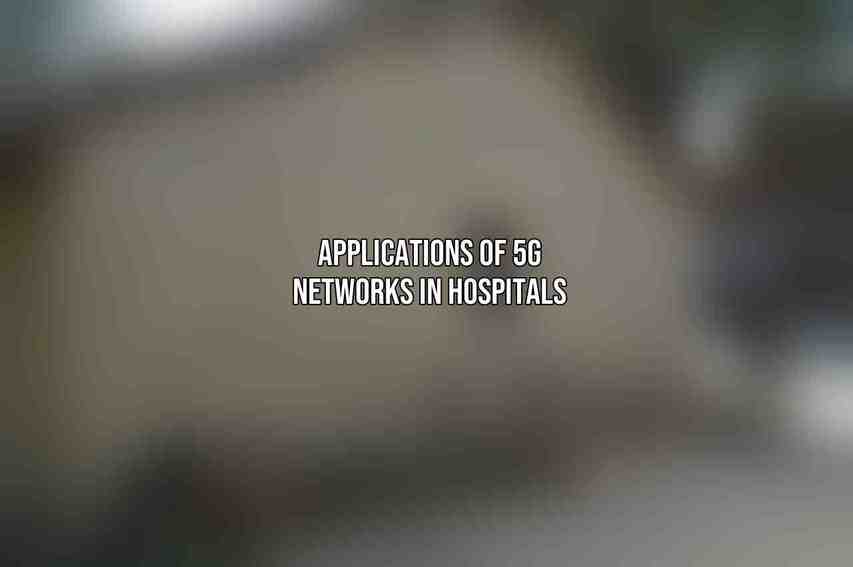5G networks represent the fifth generation of mobile network technology, characterized by high-speed connectivity, low latency, and the ability to support a massive number of connected devices simultaneously. In the healthcare sector, the implementation of 5G networks has brought about a significant transformation in the way hospitals operate and deliver services. The benefits of 5G networks for hospitals are multifaceted, ranging from enabling real-time communication to facilitating remote patient monitoring and enhancing surgical procedures.
Applications of 5G Networks in Hospitals

Remote Patient Monitoring (RPM)
Remote Patient Monitoring (RPM) is revolutionizing patient care by allowing healthcare providers to monitor patients outside of traditional clinical settings. The benefits of RPM for patients and hospitals are immense, leading to improved patient outcomes, better disease management, and reduced healthcare costs. Hospitals utilize RPM for various use cases, including monitoring vital signs, tracking medication adherence, and managing chronic conditions effectively.
Telemedicine and Telehealth
Telemedicine and Telehealth services have gained prominence with the advent of 5G networks. These technologies offer benefits such as increased access to healthcare, timely consultations, and improved patient satisfaction. Use cases of telemedicine in hospitals include remote consultations, emergency care delivery, and post-operative follow-ups, all of which contribute to more efficient healthcare delivery.
Precision Medicine and Personalized Care
Precision medicine, made possible by advancements in technology like 5G networks, tailors medical treatment to individual characteristics, such as genetics, lifestyle, and environment. The benefits of precision medicine include targeted therapies, disease prevention strategies, and the development of personalized care plans for patients. Hospitals leverage 5G technology to enhance precision medicine applications for better patient outcomes.
Surgery and Robotics
The integration of 5G networks in surgical procedures has revolutionized the field of surgery and robotics. The benefits of 5G in surgery include enhanced connectivity for remote surgery, precision in robotic-assisted procedures, and immersive experiences through virtual reality (VR) and augmented reality (AR). Hospitals utilize 5G to perform complex surgeries with greater precision and efficiency.
Hospital Management and Operations
5G plays a vital role in optimizing hospital management and operations by streamlining processes and enhancing overall efficiency. Hospitals benefit from 5G technology in various aspects of management, including asset tracking, supply chain management, energy efficiency, and staff collaboration. The implementation of 5G in hospital operations leads to cost savings, improved resource utilization, and better patient care delivery.
Case Studies
Successful implementation of 5G networks in hospitals has resulted in remarkable improvements in patient care, operational efficiency, and overall healthcare quality. However, challenges and barriers to 5G adoption in hospitals such as high implementation costs, security concerns, and regulatory compliance issues need to be addressed to realize the full potential of 5G technology in healthcare settings.
OnePlus 12R: A 5G-Enabled Smartphone for Healthcare Professionals
Key features of the OnePlus 12R
- Fast 5G connectivity
- Large display and long battery life
- Built-in health and wellness apps
Benefits of using the OnePlus 12R for healthcare professionals
- Improved communication with patients and colleagues
- Access to patient information on the go
- Enhanced productivity and efficiency
The future of 5G in healthcare holds tremendous potential for further advancements and applications in hospitals. With ongoing technological innovations and increased adoption of 5G networks, we can expect improved patient outcomes, more personalized care delivery, and enhanced operational efficiency across healthcare facilities.
By embracing the opportunities presented by 5G technology, hospitals can truly transform the way healthcare is delivered, making it more accessible, efficient, and patient-centered in the years to come.
Frequently Asked Questions
What is 5G technology and how does it differ from previous generations?
5G is the fifth generation of wireless technology that promises faster speeds, lower latency, and more reliable connections compared to its predecessors. It uses higher frequencies to transmit data, allowing for a significant increase in network capacity.
How can 5G networks benefit modern hospitals?
5G networks can benefit modern hospitals by supporting a variety of connected devices and technologies, such as telemedicine, remote monitoring, and virtual reality applications. The increased bandwidth and lower latency of 5G can improve the quality of healthcare services and enable innovative solutions for patient care.
What challenges might hospitals face when implementing 5G technology?
Hospitals may face challenges such as high initial costs for upgrading infrastructure, ensuring network security and privacy, and managing the complexity of integrating new devices and systems. Additionally, there may be concerns about potential health risks associated with prolonged exposure to 5G radiation.
How can hospitals ensure the security and privacy of patient data on 5G networks?
Hospitals can ensure the security and privacy of patient data on 5G networks by implementing robust encryption protocols, conducting regular security audits, and training staff on best practices for data protection. It is crucial for hospitals to comply with regulatory requirements, such as HIPAA, to safeguard patient information.
Read more on The Role of 5G in Advancing Smart Wearables
What are some examples of how 5G technology is already being utilized in healthcare settings?
5G technology is already being utilized in healthcare settings for various applications, such as remote surgery, telemedicine consultations, real-time monitoring of patients, and augmented reality simulations for medical training. These examples demonstrate the potential of 5G to transform the way healthcare is delivered and improve patient outcomes.

